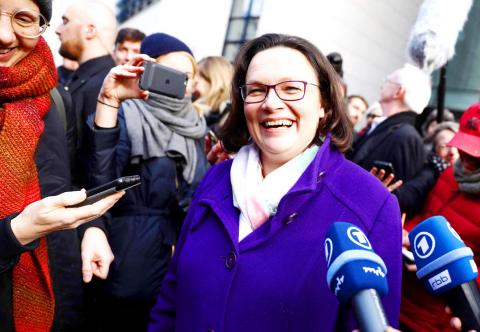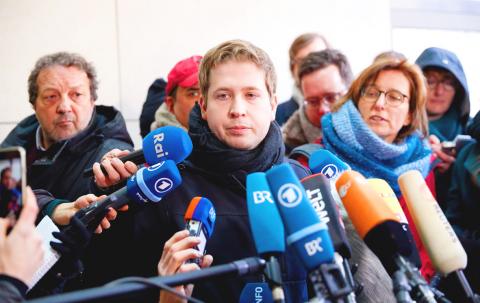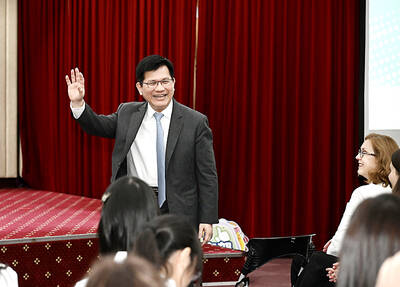German Chancellor Angela Merkel yesterday vowed to work with the Social Democratic Party (SPD) for the “good of Germany,” after the center-left party cleared the last hurdle in the way of the veteran leader’s fourth term by agreeing to join her new coalition.
Two in three of the SPD’s rank-and-file voting in a make-or-break referendum backed a new partnership with Merkel’s conservatives, heralding an end to the political stalemate that has plagued Europe’s biggest economy since inconclusive elections in September last year.
However, the chancellor, in power for 12 years, will go into her fourth term with far weaker cards than before, as she had to pay a high price to coax the reluctant SPD back into another loveless “grand coalition.”

Photo: AFP
Congratulating the SPD for its “clear result,” Merkel said using her Christian Democratic Union’s Twitter account that she was looking forward to “further cooperation for the good of our country.”
Stung by their worst post-war results, the SPD had initially ruled out another four years under Merkel’s shadow, but after Merkel’s attempt to cobble together a government with two smaller parties failed, the SPD relented.
Its leadership promised its more than 460,000 members the final say on any coalition deal.

Photo: EPA-EFE
“We now have clarity. The SPD will be in the next government,” SPD caretaker chairman Olaf Scholz said, adding that his party plans to send three male and three female ministers to the Cabinet.
European partners waiting impatiently for post-war Germany to end its longest stretch of coalition haggling heaved a sigh of relief.
French President Emmanuel Macron reacted by calling the SPD decision “good news for Europe.”
EU Commissioner for Economic and Financial Affairs Pierre Moscovici praised the party for its “responsible and decisive vote” and said on Twitter that “Germany is now ready to engage for a stronger Europe.”
However, Merkel faces a far rockier road ahead than in the past four years.
Unlike in their previous partnership when Merkel’s conservatives and the SPD enjoyed a crushing majority, this time they now have only a slim 56 percent of seats in parliament.
Wary of ceding further ground to the far-right party Alternative for Germany, Merkel’s conservatives and the SPD have inserted a clause to review their cooperation in two years.
Dissenting voices in the SPD also promise to keep the long-time partners on their toes.
SPD youth chief Kevin Kuehnert, who ran an impassioned campaign against the planned coalition, expressed disappointment at the postal referendum result.

FIREPOWER: On top of the torpedoes, the military would procure Kestrel II anti-tank weapons systems to replace aging license-produced M72 LAW launchers Taiwan is to receive US-made Mark 48 torpedoes and training simulators over the next three years, following delays that hampered the navy’s operational readiness, the Ministry of National Defense’s latest budget proposal showed. The navy next year would acquire four training simulator systems for the torpedoes and take receipt of 14 torpedoes in 2027 and 10 torpedoes in 2028, the ministry said in its budget for the next fiscal year. The torpedoes would almost certainly be utilized in the navy’s two upgraded Chien Lung-class submarines and the indigenously developed Hai Kun, should the attack sub successfully reach operational status. US President Donald Trump

Taiwan Semiconductor Manufacturing Co (TSMC, 台積電) is expected to start construction of its 1.4-nanometer chip manufacturing facilities at the Central Taiwan Science Park (CTSP, 中部科學園區) as early as October, the Chinese-language Liberty Times (the Taipei Times’ sister newspaper) reported yesterday, citing the park administration. TSMC acquired land for the second phase of the park’s expansion in Taichung in June. Large cement, construction and facility engineering companies in central Taiwan have reportedly been receiving bids for TSMC-related projects, the report said. Supply-chain firms estimated that the business opportunities for engineering, equipment and materials supply, and back-end packaging and testing could reach as high as

ALL QUIET: The Philippine foreign secretary told senators she would not respond to questions about whether Lin Chia-lung was in the country The Ministry of Foreign Affairs on Wednesday confirmed that a business delegation is visiting the Philippines, but declined to say whether Minister of Foreign Affairs Lin Chia-lung (林佳龍) is part of the group, as Philippine lawmakers raised questions over Lin’s reported visit. The group is being led by Deputy Minister of Agriculture Huang Chao-chin (黃昭欽), Chinese International Economic Cooperation Association (CIECA) chairman Joseph Lyu (呂桔誠) and US-Taiwan Business Council (USTBC) vice president Lotta Danielsson, the ministry said in a statement. However, sources speaking on condition of anonymity said that Lin is leading the delegation of 70 people. Filinvest New Clark City Innovation Park

TPP RALLY: The clashes occurred near the Chiang Kai-shek Memorial Hall on Saturday at a rally to mark the anniversary of a raid on former TPP chairman Ko Wen-je People who clashed with police at a Taiwan People’s Party (TPP) rally in Taipei on Saturday would be referred to prosecutors for investigation, said the Ministry of the Interior, which oversees the National Police Agency. Taipei police had collected evidence of obstruction of public officials and coercion by “disorderly” demonstrators, as well as contraventions of the Assembly and Parade Act (集會遊行法), the ministry said in a statement on Sunday. It added that amid the “severe pushing and jostling” by some demonstrators, eight police officers were injured, including one who was sent to hospital after losing consciousness, allegedly due to heat stroke. The Taipei